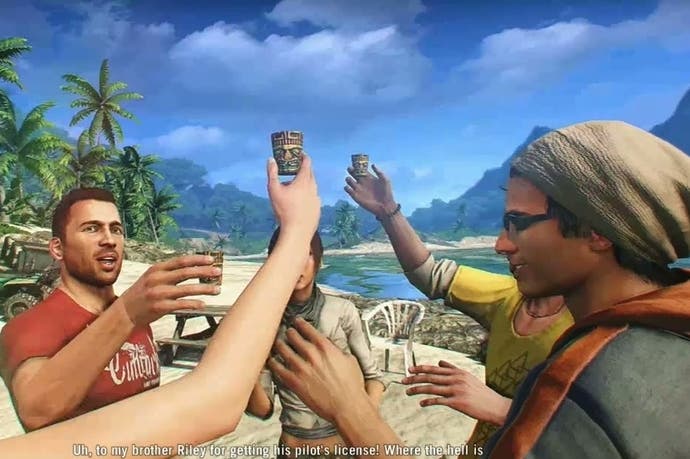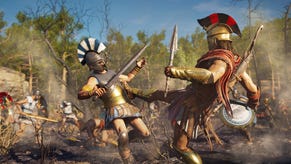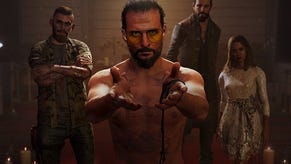Far Cry 3's writer argues critics largely missed the point of the game
"It's like a scavenger hunt where people aren't collecting the first clue.¡±
Far Cry 3's questionable writing has often been criticised after writer Jeffrey Yohalem stated the game would be about "subverting video game clichés," when in fact the game seemed to be filled with regular old video game clichés.
Yet Yohalem postulated players are missing the point and only looking at the game at face value. “The story is itself something that can be solved, like a riddle,” he said in an interview with Penny Arcade Report. “What makes me sad is that people don't engage with playing the riddle, trying to solve the riddle. It's like a scavenger hunt where people aren't collecting the first clue.”
For example, Yohalem noted the game opens with an epigraph from Lewis Carroll's Alice's Adventures in Wonderland that read, “In another moment down went Alice after it, never once considering how in the world she was to get out again." This was meant to mirror protagonist Jason Brody's surreal journey.
“The Alice in Wonderland quotes are there to clue people in. You analyse them like you would any other text and they let you know what's going on,” Yohalem said.

Many found the story of a 25 year old white American rescuing an oppressed native tribe on a third world island to be uncomfortable to say the least, but Yohalem suggested this was only a surface level thing and that Jason is an unreliable narrator and may not be the savior dudebro he's portrayed as.
"If you half-listen to the story, it seems like it's reinforcing tropes that I disagree with."
Jeffrey Yohalem, Far Cry 3 writer, Ubisoft
“It's a first-person game, and Jason is a 25-year old white guy from Los Angeles. From Hollywood. So his view of what's going on on this island is his own view, and you happen to be looking through his eyes, so you're seeing his view,” Yohalem explained. “It's set on an island in the South Pacific, so immediately the thing that comes to mind is the white colonial trope, the Avatar trope. I started with that, and it's like, 'Here's what pop culture thinks about traveling to a new place,' and the funny thing is, that's an exaggeration of most games, they just don't expose it.”
“For example, GTA is a colonisation game. You come to New York, you colonise New York. Most open world games function that way. Ezio comes to Rome and colonises Rome. To take that to its extreme, exaggerating those tropes is how you reveal them. The exaggeration of that trope is what happens in Far Cry 3.”
This is most notable in a scene used in a trailer in which Jason has sex with a scantily clad shaman princess named Citra in front of a crowd before declaring "I will lead you to glory!” On the surface it's the sort of goofy thing we'd expect from Evil Dead's Ash, but Yohalem explained that this was exaggerated to accentuate that this is a fantasy. "When you're with Citra in front of the warriors, that's Jason's fantasy, you know the white guy from LA has sex with this beautiful woman, it's very gratuitous, and it's in front of the whole tribe. It's a fantasy that we've seen in pop culture cinema.”
“What I didn't expect was the people who half-listen. If you half-listen to the story, it seems like it's reinforcing tropes that I disagree with,” Yohalem added. “People will get two-thirds through the game or halfway through the game, and they'll think that they know and they stop listening. And it's like no no no no no, we're gonna take that and totally loop it back on what you think it is, and we're agreeing with the critique!”
"My goal was to create something that people could analyze. Analysis is fun because there are many interpretations. If there's just one interpretation then it's not worth analysing."
Jeffrey Yohalem, Far Cry 3 writer, Ubisoft
Yohalem suggested that some people may not have understood Far Cry 3's message because they didn't beat it.
Massive spoilers follow!
In one ending, Jason chooses to live out his days with Citra, where he - being the ultimate badass that he is - will continue to protect the island. Only Citra has other plans and decides to murder the oblivious bloke instead.
As it turns out, Citra never really needed to be saved and the whole thing is a commentary on the princess rescuing complex that permeates the medium. "Jason conjures up this whole idea that Citra needs saving and he's gonna save her, when in reality it was all a ritual she created to find a sperm donor, and she kills him," Yohalem explained.
“Sex, violence, and the player is killed. Here are the things that satisfy our animal side as men, but they're subverted because it's a female doing it." Yohalem likened the ending to Princess Peach stabbing Mario. “Now that I'm thinking about it, that final scene should have been Citra castrating Jason. Seriously, that's the point! It is like, 'You win, motherf*****!' It's totally like, 'F*** you, you misogynist idiot!'”
End spoilers!
When asked if Yohalem would tailor his approach in the future based on Far Cry 3's writing receiving poor feedback, he was adamant that he refuses to talk down to the player. “What I'm hoping is that through talking about this game and the Internet talking about this game, is that all this stuff will come to light, and the audience will say next time, 'We want more of this,'” he said.
"The worst thing would be to waste the player's time."
Jeffrey Yohalem, Far Cry 3 writer, Ubisoft
“This all comes from my sense that players shouldn't be talked down to. For me, there's a kind of caustic relationship that's developed between players and developers. It's really a bad, abusive relationship, because developers say 'Players won't get it anyway, so we're just gonna do something that holds their hand,'" Yohalem explained. "It doesn't respect them, and then players say 'I hate this,' or 'I hate that,' or 'This game sucks,' and that hurts developers. So it's like a cycle. It also feels like critics aren't looking for meaning in the game, either. So it's like all sides have just stopped listening to each other.”
The writer was hoping Far Cry 3 would bring this sort of open to interpretation writing to the masses. He said he aims to "create a conversation between people about what they expect from video games and how much the player can be involved in an analysis of the game... Once that happens, developers will have to deliver."
“My goal was to create something that people could analyze. Analysis is fun because there are many interpretations. If there's just one interpretation then it's not worth analysing.”
He further stressed the importance of thoughtful writing in games, stressing that he wouldn't want to simply create a vapid time-sink. “I think we have a very limited amount of time on this earth, and it should be spent doing valuable things,” he said. “For me, the worst thing would be to waste the player's time.”










